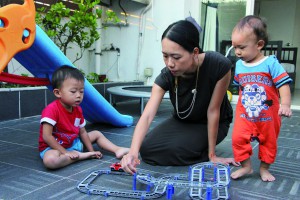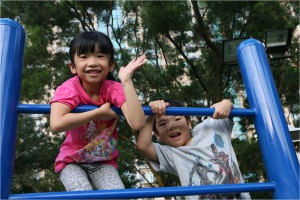Katherine Lam Suet-ying agrees. Her three-year-old son Ethan Chen Chit-yu studies in the playgroup at RTC Gaia School. He gets to wear his own clothes, run barefoot as fast as he likes and roll in the sand in the school playground.

Instead of being a waste of time, Lam thinks play encourages children to learn proactively. She accompanies her son to school every day and finds the older children are always asking her to teach them words through storytelling.
“Playing a lot makes them have a strong desire to learn. I think it is very important because it [education] goes a long way.”
Lam turned to the Gaia School after sending Ethan to a conventional kindergarten when he was two. There, the children’s time was strictly controlled. Even when Ethan was given fifteen minutes of play, he would have to spend three of those minutes carrying out tasks such as packing up, queuing up and washing his hands. She believes such strict rules restrict children’s creativity whereas she wants Ethan to grow up to be an independent thinker who does not just follow the crowd.
“I am also one of the victims growing up under Hong Kong’s education system… I never thought about where my passion lies when I was small.”
Despite the easier curriculum and abundance of time to play, the school’s founding principal says students have little trouble adapting to mainstream schools later on. Zhiqiu, or Autumn (all staff at the school go by names taken from nature) says his graduates often have better social skills than other children.
With tuition fees of HK$49,000 a year, the Gaia School is too expensive for many families and even for those who can afford it, its model represents a risky leap of faith. But that is not to say that some do not try to incorporate more free play into their children’s lives.
Vanessa Lui Lai-lei, a full-time mother of five-year-old twins, cherishes her children’s playtime. She knows the twins will have less time to play after entering primary school next year, so she plays outdoors with them whenever she can and reserves Sundays for them to play all day.

“If [children] do not play before entering primary school, they then have no time to play,” Lui says.
Among her peers, Lui is a little unusual. She says many of her friends with preschool children have already reduced playtime due to anxieties about primary school admissions. The belief that getting into a prestigious primary school will translate into a higher chance of entering university drives parents to arrange learning activities for their children from morning till night.
Lui says the education system, which encourages intense competition, bears the biggest responsibility for robbing children of their right to play. “The current education system runs counter to our perception of play.”
She criticises schools’ focus on academic training and achievement to boost their rankings, pointing to the Territory-wide System Assessment (TSA), which gauges primary three students’ basic competences in Chinese, English and mathematics as an example. Although the Education Bureau says it does not use the TSA to rank schools, some teachers have questioned if this is really the case and many schools still drill children on the tests.
Lui is not alone. In recent months, tens of thousands of parents have called on the government to scrap the TSA tests and more than 31,000 have joined a Facebook group called the Homework Slaves Liberation Movement. Lui believes the education system needs to keep up with the times and focus more on student development. She calls for a review of government policies and hopes young teachers can bring fresh insights into the system. If schools continue to focus on competing for rankings, they will further sacrifice children’s playtime to boost their academic results.
“Students will only become nerds with high grades, but not truly smart and intelligent kids,” she says.
Edited by Kanis Leung










































